#parliamentary assembly
Text
PACE Committee on Equality and Non-Discrimination on combating racism and intolerance made the following statement

“The International day for the elimination of racial discrimination is an opportunity to reflect on the progress achieved in countering racism at global level, and on how to tackle the challenges that people of African descent still face. This year, as the International Decade for People of African Descent 2015-2024, proclaimed by the General Assembly of the United Nations, draws to a close, the picture is far from satisfying.
In 2020, the violent death of George Floyd at the hand of the police and the widespread protests that followed on both sides of the Atlantic sparked awareness of the extent of Afrophobia and the need to tackle it. A window of opportunity seemed to be open for legislators, policy makers and the society at large to seize. The developments since then are not always positive. Deeply entrenched racism endures. New forms of prejudice targeting people of African descent emerge. The current political landscape is a reason for concern, with racist and xenophobic populist movements resisting progress and undermining the struggle for inclusiveness and respect.
As members of the Committee on equality and non-discrimination, we reaffirm on this occasion our commitment to counter all forms of racism. Referring to Resolution 2389 (2021) on Combating Afrophobia, or anti-Black racism, in Europe, we reiterate our call on fellow politicians and public authorities to counter racism in all its forms, including at institutional level, and multiple and intersectional discrimination; recognise the contribution of people of African descent to Europe’s development and culture; and to recognise the negative impact of colonialism, enslavement and the transatlantic slave trade.
Finally, we reiterate our support to the No Hate Parliamentary Alliance. We believe in the Charter of European political parties for a non-racist and inclusive society, based on political parties self-regulation power, as an important tool to prevent and counter racial discrimination.”
#PACE-APPS#21 march#international day for the elimination of racial discrimination#council of europe#parliamentary assembly#statements
0 notes
Text
Hasipoğlu poses a question to Christodoulides
The Head of the TRNC’s PACE delegation, National Unity Party MP Oğuzhan Hasipoğlu posed a question to the Greek Cypriot Leader Nikos Christodoulides at the Parliamentary Assembly of the Council of Europe (PACE) General Assembly.
Continue reading Hasipoğlu poses a question to Christodoulides
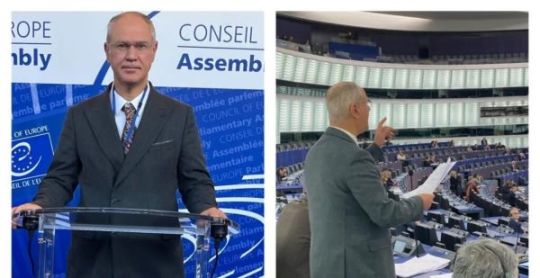
View On WordPress
#Council of Europe (PACE)#General Assembly#Greek Cypriot Leader Nikos Christodoulides#National Unity Party MP Oğuzhan Hasipoğlu#Parliamentary Assembly#Posed a question
0 notes
Text
youtube
President Volodymyr Zelenskyy spoke Monday (English with Ukrainian subtitles in the vid) to a session of the NATO Parliamentary Assembly.
He drew connections between Russia's atrocities in Ukraine and Hamas's atrocities in Israel.
These days, our attention is focused on the Middle East. No one can ever forget what the terrorists did in Israel. Thousands of missiles against peaceful cities. Shooting people in cars on the roads. Men, women, children. No one was spared. Streets covered in blood. Hostages. The terrorists themselves gave the world footage of the atrocities, and were proud of them. Women who were beaten. Elderly people who were kidnapped from their homes. Abducted children. And we do not yet know how many people were captured and brutally taken away by the terrorists. They even tried to humiliate the dead by mocking their bodies.
We saw all of this in Israel.
And the Israelis themselves – Israeli journalists who were here in Ukraine, who were in Bucha, are now saying that they saw the same evil where Russia came. The same evil, and the only difference is that there is a terrorist organization that attacked Israel, and here is a terrorist state that attacked Ukraine. The intentions declared are different, but the essence is the same. You see it. You see the same blood on the streets. You see the same civilian cars shot up. You see the same bodies of people who have been tortured.
Terrorism is terrorism whether it is state strategy by Putin's Russia or committed by the homicidal fanatics of Hamas. Both Putin and Hamas have indiscriminately killed civilians as a matter of policy.
The Hamas attack from Gaza is in the interest of Putin. It potentially could interrupt the flow of aid to Ukraine. It also diverts international attention from ongoing Russian war crimes.
Hamas is a wholly owned subsidiary of the misogynist régime in Iran. Iran supplies Russia with Shahed drones and finds common autocratic ground with Putin.
Don't be surprised if it turns out Russia encouraged Iran to push Hamas into conducting this attack or even provided intelligence to assist with it.
Russia has a major presence in Syria where it has committed atrocities in Syria's ongoing civil war to assist dictator Bashar al-Assad who came to power about half a year after Putin did. So destabilizing the Middle East would not be out of character for Putin.
#invasion of ukraine#volodymyr zelenskyy#NATO parliamentary assembly#terrorism#stand with ukraine#russia#russian atrocities#vladimir putin#iran#shahed drones#hamas#hamas atrocities#israel#gaza#syria#парламентська асамблея НАТО#володимир зеленський#російський тероризм#ישראל#россия - террористическая страна#путин – убийца#владимир путин#путин хуйло#геноцид#хамас#израиль#руки прочь от украины!#геть з україни#слава україні!#героям слава!
8 notes
·
View notes
Text
A decade after the times of “Caviar Diplomacy” when Azerbaijan would buy up support from the delegates of the Parliamentary Assembly of the Council of Europe (PACE), the mood among European politicians has turned a full 180 degrees. The Azerbaijani delegation was excluded from the sessions for a year by a clear majority of the votes for the “persistent violation of norms and standards of the institution” and a lack of cooperation with PACE. Is this the beginning of the end of Baku’s participation in the Council of Europe?
The long faces of the Azerbaijani delegates on display on January 24th left no questions. The hopes that their bad spell would turn around were miniscule. A debate and vote were about to take place a few hours later at the behest of the German representative Frank Schwabe from the SPD. It called for the suspension of Azerbaijan as a member of the Parliamentary Assembly of the Council of Europe – an institution that since 1949 has watched over human rights and brought together almost all of Europe’s states (except for Belarus and Russia).
A day prior, the monitoring committee had produced a report that was positive to the motion and most of the parliamentary groups declared their support for Schwabe’s initiative. The head of the Azerbaijani delegation, Samed Seyidov, left the session before it was finished following a number of critical comments from the rest.
The Azerbaijani representatives decided to return to Baku earlier than planned and changed their tickets for Thursday morning, despite the winter session of the parliament ending on Friday. They had no intention to show up to Wednesday’s vote anyway. In a truly PR-like play the delegation decided to remove itself from the Council of Europe, before the Assembly intended to.
In a six-minute long press statement released on January 24th, Seyidov informed the journalists that Azerbaijan joined the Council of Europe in 2001 with hopes that PACE would aid the country in “restoring the rights of hundreds of thousands of Azerbaijanis who had been impacted by Armenia’s invasion and occupation on parts of the country’s internationally recognized territories”, which would lead to “justice in the name of reaching a lasting peace in the region”. However, over two decades, PACE has done nothing in this regard according to the delegation. Now, following an Azerbaijan’s military victory in Karabakh and the restoration of its territorial integrity, the country “is facing an organized campaign of slander”. Seyidov also accused PACE of being “Azerophobic and Islamophobic” and ended his statement with the announcement of Azerbaijan suspending its membership in the Parliamentary Assembly, until it decides otherwise.
After reading their release the six-person delegation immediately descended on a staircase into the flanking corridors disappearing inside a symbolic elevator. Three hours later the representatives of PACE delivered the final blow with 76 votes for, 10 against and 4 abstentions, delivering a decision through simple majority that suspended Azerbaijan for 12 months. An important addition was added that stated the representatives could return earlier if there are positive changes in the country. Despite the corruption scandals, after 23 years of an uninterrupted presence in PACE, dark clouds finally appeared above the Azerbaijani delegation.
continue reading
#azerbaijan#parliamentary assembly of the council of europe (PACE)#suspension#council of europe#membership questioned#human rights abuses#nagorno karabakh exodus
0 notes
Text

"ROBLIN AND ROGERS MUST FACE CHARGES IN CORRUPTION CASE," Vancouver Sun. November 18, 1912. Page 1.
----
Premier of Manitoba and Dominion Minister Accused of Corrupting the Police.
----
(Sun's Leased W. A. P. Wire.)
WINNIPEG, Man., Nov. 17. - Saurday afternoon a protest was filed against the election of Alex. Morrison as member of parliament for Macdonald. The petitioners are Dr. Myles of Treherne and John E. Woods of Somerset, electors in the constituency. The petition claims that Mr. Morrison himself and through his agents was guilty of bribery, treating, personation and undue influence. Charges of bribery and corruption are set forth in the petition, and charges are also made of providing liquor, illegal conveying of the voters to the poll and intimidation.
The charge is also made of the misuse of the police of the province. It is alleged that Hon. Robert Rogers, Sir R. Roblin and Hon. C. H. Campbell employed and gave instructions to the justice of the peace, police officials, detective agents and other persons to arrest and put in jail and keep confined persons whom they discovered to be acting in the interest of the opposition candidate, R. L. Richardson.
#winnipeg#parliamentary election#legislative assembly of manitoba#electoral fraud#false pretences#corrupt officials#abuse of authority#premier of manitoba#canadian criminal justice system#conspiracy theorizing#crime and punishment in canada#history of crime and punishment in canada
0 notes
Text
ПАРЄ визнала рф диктатурою
13 жовтня 2023 року Парламентська асамблея Ради Європи (ПАРЄ) закликала держави-члени Ради визнати горе-очільника рф нелегітимним після закінчення його нинішнього президентського терміну та оголосила саму рф диктатурою.
В ухваленій одноголосно резолюції ПАРЄ також закликала припинити всі контакти з недопрезидентом рф, за винятком гуманітарних контактів.
Заразом Асамблея підтвердила свою підтримку…

View On WordPress
#ПАРЄ#Парламентська асамблея Ради Європи#Рашизм#Резолюція#PACE#Parliamentary Assembly of the Council of Europe#Russian Crimes#Russo-Ukrainian War
0 notes
Text
Forgive me for making yet another post about the French Revolution but one small detail that makes me laugh is when, as things started to go seriously wrong, one of Louis XVI's advisers tried to persuade him & Marie-Antoinette to get away from Paris and wait for things to calm down (the idea was "if you lay low and wait, the newly-created National Assembly will vote something stupid and lose popular support" which was a solid plan honestly.) But he was also like "whatever you do, DO NOT go East or South or people will think you'll get help from other monarchies to restore your power and that won't calm things down"
So the King was advised to flee to Normandy, which... is just a short ferry ride away from another monarchy. But that's completely different since it's England. To be fair to the English, the French monarchy had basically bankrupted itself a few years back to send millions in support of the American revolutionaries because it would be a shame not to take advantage of "perhaps the best opportunity for centuries to come to put England in its place" (actual quote by France's minister of Foreign Affairs in 1777)
—still I love the realistic approach of the King's adviser telling him, Sire you can't go near any of our borders rn, it'll escalate the situation, Parisians will know you're trying to get another country to help. Obviously you can go set up camp right across the sea from England though, that's fine since everyone knows the English wouldn't piss on us if we were on fire¹
¹ Perfidious Albion was like "aw no France is in turmoil and possibly weakened :) a shame :)" exactly like France re: them at the start of the US independence war
² they also thought well these backward french are finally following our glorious example and entering civilisation (parliamentary monarchy)
³ and only when the Girondins started being like "let's spread the French Revolution to the whole universe!!! or at least Belgium" did England finally decide "it's been a while since we last declared war on France actually" (but it was too late for Louis XVI)
⁴ That's not how footnotes work sorry. Trying to make my post look fancier
#autumn is when i read books about my pet century (the 18th)#current one is simone bertière's excellent biography of marie-antoinette which mentions all the above and much more!#i discovered that when she was a prisoner marie-antoinette used paul & virginie as a book cipher to encrypt her letters which made me laugh#i'll be the first to say it but paul & virginie was the Twilight of the 18th century#good on our late austrian queen for finding a use for this boring preachy novel
2K notes
·
View notes
Text
NASS Staffs says it has reach an arrangement with Senate, suspends strike after one week
NASS Staffs says it has reach an arrangement with Senate, suspends strike after one week
NASS Staffs says it has reach an arrangement with Senate, suspends strike after one week
(more…)
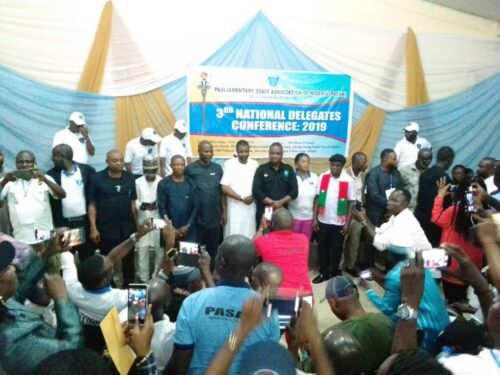
View On WordPress
#NASS#NASS Staffs#National Assembly#Parliamentary Staff Association of Nigeria (PASAN)#PASAN Chairman#Sunday Sabiyi
0 notes
Text
France concludes 1st round of parliamentary elections
France concludes 1st round of parliamentary elections
PARIS
France concluded the first round of elections to determine the 577 lawmakers of its National Assembly on Sunday as of 8 p.m. local time (1800GMT).
According to the Foreign Ministry, voter turnout stood at 39.42% as of 5 p.m., whereas this figure was 40.75% in 2017. The number of eligible French voters is about 48.7 million.
A total of 6,293 candidates are competing in the polls, and a…
View On WordPress
#1st#Anadolu Agency#concludes#Elections#Emmanuel Macron#Ensemble!#France#Jean-Luc M&233;lenchon#National Assembly#Nupes#parliamentary#parliamentary polls
0 notes
Text
Armenian Prime Minister Nikol Pashinyan said Azerbaijan may be preparing for military aggression against his country as the term "Western Azerbaijan," has become increasingly popular in public discourse in Azerbaijan.
During a Nov. 18 speech at the OSCE Parliamentary Assembly in Yerevan, Pashinyan claimed Azerbaijan media, schools, and universities had started calling Armenia this way, warning the rhetoric could signal Baku's desire to start an offensive military operation.
United States Secretary of State Antony Blinken warned a select group of lawmakers that Azerbaijan might be planning to invade Armenia in the coming weeks, Politico reported on Oct. 13.
Officials familiar with the discussion told Politico that Blinken spoke about the possibility of an invasion in a conference call on Oct. 3.
The call addressed officials' questions about the U.S. response to Azerbaijan's September offensive in Nagorno-Karabakh.
During the call, Blinken reportedly told lawmakers that the State Department will not renew an established agreement that permits the U.S. to offer Azerbaijan military aid. The agreement has been renewed every year since 2002 but lapsed in June.
In the same conversation, Blinken warned that Azerbaijan may invade southern Armenia.
Of particular concern is the southern region of Syunik, which Azerbaijan calls the Zangezur Corridor and Azerbaijani President Ilham Aliyev has repeatedly referred to as "Western Azerbaijan."
In mid-September, the Azerbaijani military launched a lightning offensive against the Nagorno-Karabakh Republic, an unrecognized Armenian state within the territory of Azerbaijan. Local authorities eventually surrendered in a ceasefire mediated by Russia.
A formal decree was later signed, dissolving all official institutions of the breakaway state from Jan. 1, 2024. Following Azerbaijan's victory, around 100,000 people have left Nagorno-Karabakh for Armenia.
131 notes
·
View notes
Text
TRNC Assembly Committee attend TURKPA Meeting
TRNC Assembly Committee attend TURKPA Meeting
Chairperson of the TRNC Assembly’s Committee on Legal, Political and Foreign Affairs Yasemin Öztürk, Deputy Chairman of the Committee Ongun Talat and Committee Member Hasan Küçük attended the first Meeting of Chairpersons of the National Defence Commissions of the Parliamentary Assembly of Turkic States (TURKPA).
Continue reading TRNC Assembly…

View On WordPress
#Attend TURKPA Meeting#National Defence Commissions of the Parliamentary Assembly of Turkic States (TURKPA).#TRNC Assembly Committee
0 notes
Text
During the Black Sea Economic Cooperation Parliamentary Assembly held in Ankara, a representative of the Russian Federation tore the Ukrainian flag out of the hands of the Ukrainian deputy, Oleksandr Marikovsky.
Immediately found out about fucking around. 🇺🇦
164 notes
·
View notes
Text
Last week, Togo postponed legislative elections that had been scheduled for April 20, following a contentious constitutional reform. The office of President Faure Gnassingbé said more “consultations” over the changes were needed before a new election date could be announced.
On March 25, Togo’s National Assembly adopted a charter that will transform the country from a presidential to a parliamentary system. Executive power will lie with a “president of the council of ministers,” effectively a prime minister, while Togo’s existing presidency will be reduced to a ceremonial role. The National Assembly will elect the president to a single six-year term, abolishing direct elections.
Togo’s opposition argues that the reforms are a ploy to keep the unpopular Gnassingbé in power, avoiding being voted out by a public weary of presidents serving for life. “He was never elected … and he knows that the Togolese people are lying in wait for him in the next election,” opposition politician Brigitte Adjamagbo-Johnson told [French State Media] Radio France Internationale.
Togo gained independence from France in 1960 and has been largely run by the Gnassingbé family since. Gnassingbé’s father seized power in a 1967 military coup, and the younger Gnassingbé succeeded him in 2005 after his death in office. He’s served four terms since then—which was possible because in 2002, the constitution had been amended to abolish a two-term limit and allow the elder Gnassingbé to stand again.[...]
The capital, Lomé, experienced nearly a year and half of protests between 2017 and 2018, with demonstrators demanding that Gnassingbé resign. They ended only when the government agreed to reestablish a two-term limit for the presidency in a truce brokered by [ECOWAS][...]
Togo’s ruling government is comprised exclusively of members of Gnassingbé’s Union for the Republic party. A group of major opposition figures boycotted the last legislative elections in 2019, claiming that the country’s electoral commission was not independent.
10 Apr 24
31 notes
·
View notes
Text
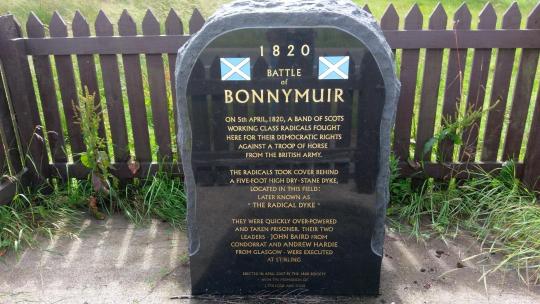
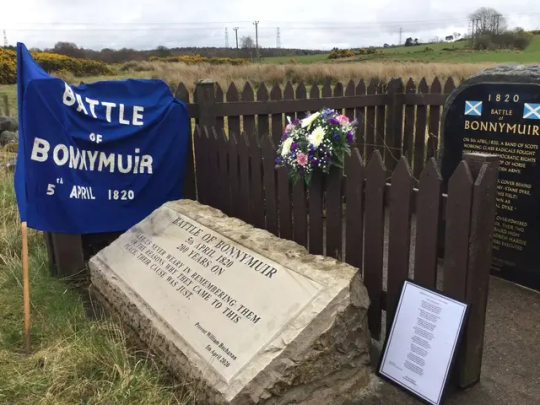
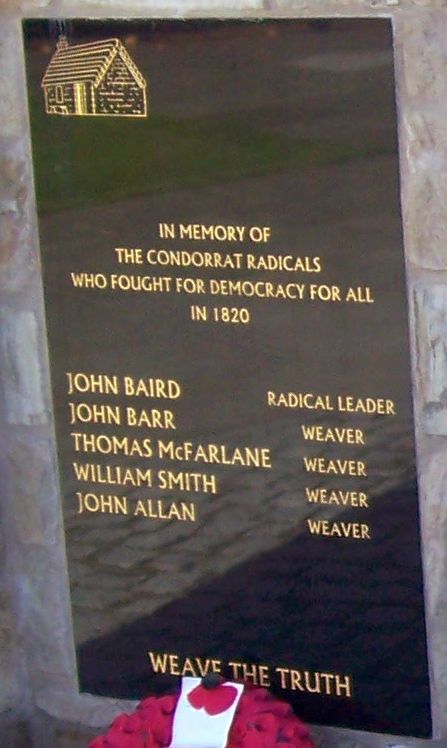
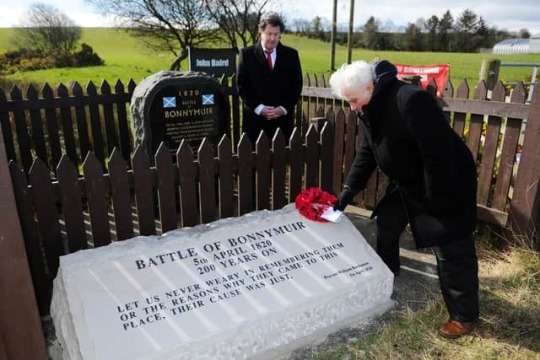
On 5th April 1820 government forces defeated Radical weavers at what became known as the Battle of Bonnymuir.
The ‘Radical Rising’ or ‘Radical War’ of 1820, also known as the Scottish Insurrection of 1820, was a week of strikes and unrest in Scotland that culminated in the trial of a number of ‘radicals’ for the crime of treason. It was the last armed uprising on Scottish soil, with the intent of establishing a radical republic.
Based in Central Scotland, artisan workers (such as weavers, shoemakers, blacksmiths), initiated a series of strikes and social unrest during the first week of April 1820. This pushed for government reform, in response to the economic depression. The Rising was quickly, and violently, quashed, and the subsequent trials took place in Scotland from July to August 1820.
The events of the Rising followed years of economic recession after the end of the Napoleonic Wars and considerable revolutionary instability on the European continent. As the economic situation worsened for many workers, societies sprung up across the country which espoused radical ideas for fundamental change.
In the early nineteenth century, Scottish politics offered power to very few people. Councillors on the Royal Burghs at this time were not elected to their position, rich landowners controlled county government and there were fewer than 3,000 parliamentary voters in the whole of Scotland, hardly a democracy.
It was recognised that the key to change was electoral reform, and the events of the American Revolution of 1776 and French Revolution of 1789 helped to promote these ideas. Radical reformers began to seek the universal franchise (for men), annual parliaments, and the repeal of the Act of Union of 1707.
Between 1st and 8th April 1820, across central Scotland, some works stopped, particularly in weaving communities, and radicals attempted to fulfil a call to rise. Several disturbances occurred across the country, perhaps the worst of which were the events at Bonnymuir, Stirlingshire, where a group of about 50 radicals clashed with a patrol of around 30 soldiers, while Bonnymuir is the most famous, or should I say infamous of the events during this period, it was by no means the only “uprising”
On Monday April 3rd a strike took force across a wide area of Scotland including Stirlingshire, Dunbartonshire, Renfrewshire, Lanarkshire and Ayrshire, with an estimated total of around 60,000 stopping work.
Reports were made of men carrying out military drill in Glasgow while foundries and forges had been raided, and iron files and dyer's poles taken to make pikes. In Kilbarchan soldiers found men making pikes, in Stewarton around 60 strikers was dispersed, in Balfron around 200 men had assembled for some sort of action. Pikes, gunpowder and weapons called "wasps" (a sort of javelin) and "clegs" (a barbed shuttlecock to throw at horses) were offered for sale.
In Glasgow John Craig led around 30 men to make for the Carron Company ironworks in Falkirk, telling them that weapons would be there for the taking, but the group were scattered when intercepted by a police patrol. Craig was caught, brought before a magistrate and fined, but the magistrate paid his fine for him.
Rumours spread that England was in arms for the cause of reform and that an army was mustering at Campsie commanded by Marshal MacDonald, a Marshal of France and son of a Jacobite refugee family, to join forces with 50,000 French soldiers at Cathkin Braes under Kinloch, the fugitive "Radical laird" from Dundee.
Government troops were ready in Glasgow, including the Rifle Brigade, the 83rd Regiment of Foot, the 7th and 10th Hussars and Samuel Hunter's Glasgow Sharpshooters. In the evening 300 radicals briefly skirmished with a party "of cavalry", but no one came to harm.
The next day, Tuesday April 4th, Duncan Turner assembled around 60 men to march to Carron, while he carried out organising work elsewhere. Half the group dropped out, however the remaining twenty five, persuaded that they would pick up support along the way, set out under the leadership of Andrew Hardie. They arrived in Condorrat, which was on the way to Carron, at 5am on April 5th. Waiting for them was John Baird who had expected a small army, not this bedraggled and soaking wet group. He was persuaded to continue the March to Carron by John King, who would himself go ahead and gather supporters. King would go to find supporters at Camelon while Baird and Hardie were to leave the road and wait at Bonnymuir.
What the leaders didn’t know is that the Government had placed spies and agitators among the crowds and they were lured to the confrontation with well-armed, trained soldiers on Bonnymuir,
The authorities at Kilsyth and Stirling Castle had however been alerted and Sixteen Hussars and sixteen Yeomanry troopers had been ordered on 4 April to leave Perth and go to protect Carron. They left the road at Bonnybridge early on April 5th and made straight for the slopes of Bonnymuir. As the newspapers subsequently reported:
"On observing this force the radicals cheered and advanced to a wall over which they commenced firing at the military. Some shots were then fired by the soldiers in return, and after some time the cavalry got through an opening in the wall and attacked the party who resisted till overpowered by the troops who succeeded in taking nineteen of them prisoners, who are lodged in Stirling Castle. Four of the radicals were wounded".
The Glasgow Herald mocked the small number of radicals encountered, but worried that "the conspiracy appears to be more extensive than almost anyone imagined... radical principles are too widely spread and too deeply rooted to vanish without some explosion and the sooner it takes place the better."
The end of the Rising
On the afternoon of April 5th, before news of the Bonnymuir fighting got out, Lees sent a message asking the radicals of Strathaven to meet up with the "Radical laird" Kinloch's large force at Cathkin. The next morning a small force of 25 men followed the instructions and left at 7 a.m. to march there. Among them was the experienced elderly Radical James Wilson who is claimed to have had a banner reading "Scotland Free or a Desart"
At East Kilbride they were warned of an army ambush, and Wilson, suspecting treachery, returned to Strathaven. The others bypassed the ambush and reached Cathkin, but as there was no sign of the promised army they dispersed. Ten of them were identified and caught, and by nightfall on April 7th; they were jailed at Hamilton.
I’ll leave things there for the moment, the aftermath will be told in further posts, one in a few days, and more as the ringleaders were made examples of as they were tried for their parts in the events.
The large memorial stone to mark the 200th anniversary of the Battle of Bonnymuir was unveiled in April 2021.
20 notes
·
View notes
Text

"NO LUMP PAYMENTS WILL BE ALLOWED," Toronto Globe. January 9, 1913. Page 9.
----
Workmen's Compensation Will be Carefully Arranged
----
RAILWAYS BY THEMSELVES
----
Farm Laborers Not to be Included as an Industrial Hazard - Sir William Explains Points in the Proposed Legislation.
----
Sir William Ralph Meredith at the workmen's compensation inquiry yesterday morning made it clear in two important details which way his recommendations would go. In the first place there will be no scheme that would give the right of lump sum payments. Even the administering board could not authorize it. The other is that railways will not be grouped with other industries, but that any scheme they may adopt will be in line with the general principles of the proposed act. Farm laborers for the time being will not be included as an industrial hazard.
The non-appearance of Mr. F. W. Hinsdale, chief auditor of the Industrial Commission of the State of Washington, altered Sir William's plans somewhat, and instead of taking evidence the time was given over to a general discussion of the proposed scheme.
Mr. Wegenast, for the Canadian Manufacturers' Association, told the Commissioner that the Ontario system would affect 400,000 people, and Sir William figured that the probable cost would be $250.000. Mr. Wegenast contended that the grant in Washington State was inadequate, that the Commission should be allowed to group the classes, and that the payroll should not be the only standard of indemnity.
Farmers Not Included
In reply to a question by Sir William, it was conceded that farmers would not come under the act in the meantime, as this might impede the passing of the act through the Legislature. The Commissioner said that he was mindful of the positions occupied by persons employed on the farm, but it was not the same as an employee of a railway or a factory.
"What would the manufacturers think if legislation was recommended under which the employer should be obliged personally to pay the whole of the compensation?" Sir William asked Mr. Wegenast.
"Any reasonable compensation for negligence would not be objected to. but returns from this source should not go directly to the employee, but to the general fund," replied Mr. Wegenast.
"I suppose in the last analysis the proposed legislation will be a tax on the community. Of course the railways, for example, can look after themselves, but what of the producers of wheat and of silver?" continued Sir Willlam.
Mr. Hellmuth - "But in the case of railways the rates can always be checked and established by the Dominion Railway Board."
The Act in Danger.
Sir William - Yes, but my experience has always been that such rates are invariably far above those which ordinary business conditions would alone compel. I want to say that if the manufacturers or the railways can form schemes of their own they will break down the act. The idea that I have is that the railways should be excluded from any group for the present:
"From the standpoint of expediency I agree with your Lordship, but on principle I disagree," interrupted Mr. Wegenast.
"Principle is nothing in this case, and expediency is everything. To accomplish anything definite we must be prepared to compromise."
The labor representatives did not agree with this announcement, and Mr. Hellmuth objected to the C.P. R. being placed in a group alone and paying into the fund to judge the effect in the prevention of accidents and the consequent adjustment of the assessments.
Early in the discussion Sir William declared: "This legislation is social; there is no disguising the fact. The very basis of it is to prevent the injured workman becoming a charge on the community. If this were not so one of the primary objects of the scheme would be defeated. If we allow compensation in a lump sum it might be squandered, and if that were permitted it would defeat our primary object."
He also intimated that there could be no legislation that would imply a guarantee upon the Province.
Mr. F. N. Kennin, Secretary of the Commission, stated last night that he had word that Mr. F. W. Hinsdale would be present at the hearing this morning, and his evidence would probably cover the entire day. The sitting will commence at 11 o'clock this morning in the Private Bills Committee room at the Parliament buildings.
#legislative assembly of ontario#queen's park#workman's compensation#royal commission#william ralph meredith#workers' compensation#ontario history#ontario politics#organized labour#parliamentary debate#workplace injuries#workplace accidents#working class struggle
0 notes
Text
ПАРЄ визнала Голодомор 1932-1933 років геноцидом українського народу
12 жовтня 2023 року Парламентська асамблея Ради Європи проголосувала за визнання Голодомору 1932-1933 років актом геноциду українського народу. Також асамблея закликала до послідовної підтримки України у війні з рф.
_________
On October 12, 2023 the Parliamentary Assembly of the Council of Europe adopted a resolution recognising the Holodomor of 1932-1933 as an act of genocide of the Ukrainian…

View On WordPress
#Визнання#Голод#Голодомор#ПАРЄ#Пам&039;ять#Парламентська асамблея Ради Європи#Рашизм#Резолюція#PACE#Parliamentary Assembly of the Council of Europe#Russian Crimes#Russo-Ukrainian War
0 notes